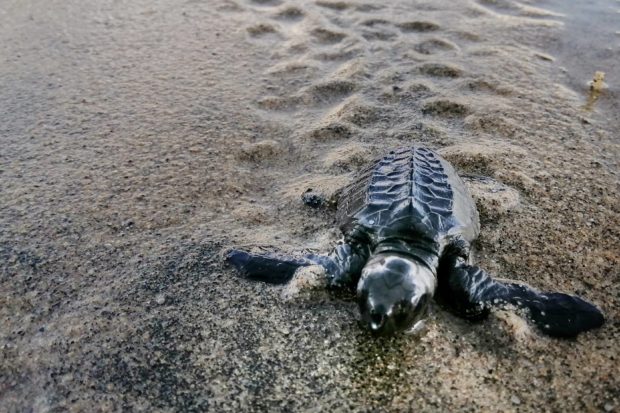
HEADS TO SEA One of 22 sea turtles hatched in the village of White Beach in Pagadian City crawls to the sea after being released by residents who protected its nesting site. —LEAH AGONOY
PAGADIAN CITY—Twenty-two “pawikan” (sea turtle) hatchlings were released to the sea in the village of White Beach here, almost two months after a resident saw a marine turtle laying eggs in an isolated patch of this city’s shoreline.
Rolando Bongkawil, a member of the village council of White Beach, said he guarded the eggs “day and night” to ensure that the nest would not be disturbed.
“I watched over them like a father,” he said. “They were laid a few meters from my house, and being a barangay official, I made sure that they were secured,” he said.
Rodel Arabes, a staff at the City Environment and Natural Resources Office who guided the release, said the hatchlings were Olive Ridley sea turtles, considered critically endangered due to their habitat and nesting site degradation.
Fighting poachers
Vicky Toledo, 61, a resident, said she saw a large turtle emerge from the sea while she was on her way home to Purok Tangigue at dusk on Jan. 9. The turtle went to an isolated part of the beach and when she realized it was laying eggs, she went to Bongkawil’s house nearby to report her find.
Villagers counted 60 eggs that the pawikan laid that night, of which only 22 survived to be released back to the sea.
Village officials fenced off the spot where the eggs were laid to secure it against poachers. Pawikan eggs are considered aphrodisiac and pawikan meat, a delicacy in the area.
“There were individuals who get to harvest turtle eggs and cook it like the regular eggs. Some even hunt the pawikan and cook them with the typical meat recipes as they believe it would make them stronger,” said village chief Rey Rabanos.
But he said this was already a past practice since residents of Barangay White Beach are now keen in protecting the species. Most villagers lived on fishing and seaweed farming and they believed that anything that would harm the environment could also harm their livelihood, Rabanos said.
“Abusing the environment and the different species living around would badly affect our harvests,” said Toledo, a seaweed farmer and fisher.It was the second time that a sea turtle had laid eggs in the area.
White Beach residents first monitored a pawikan laying eggs in the village on Dec. 26 last year. Village officials then stopped boats from docking near the nesting area.
But of the 60 eggs that were laid on the same spot last year, only 20 were hatched. Villagers released the hatchlings on Feb. 19.
“[Villagers] all helped in protecting the eggs,” Rabanos said.
After the recent release, village officials said they were planning to declare the area a nesting site for sea turtles. The declaration will ban the construction of any structure in the area or its use for recreational or other activities. —LEAH AGONOY